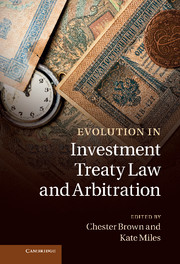Book contents
- Frontmatter
- Contents
- Contributors
- Editors' preface and acknowledgements
- Table of cases
- Table of Treaties
- Part I Introduction
- Part II Shifts in fundamental character
- Part III Actors in international investment law
- 8 Sovereign wealth funds and international investment law
- 9 Investor misconduct: Jurisdiction, admissibility or merits?
- 10 The European Union as a global investment partner: Law, policy and rhetoric in the attainment of development assistance and market liberalisation?
- 11 The ‘fair and equitable treatment’ standard and the circumstances of the host State
- 12 The plea of necessity under customary international law: A critical review in light of the Argentine cases
- 13 Making way for the public interest in international investment agreements
- 14 The participation of sub-national government units as amici curiae in international investment disputes
- Part IV The new significance of procedure
- Part V Engagement with cross-cutting issues
- Part VI Conclusions
- Index
- References
12 - The plea of necessity under customary international law: A critical review in light of the Argentine cases
from Part III - Actors in international investment law
Published online by Cambridge University Press: 05 December 2011
- Frontmatter
- Contents
- Contributors
- Editors' preface and acknowledgements
- Table of cases
- Table of Treaties
- Part I Introduction
- Part II Shifts in fundamental character
- Part III Actors in international investment law
- 8 Sovereign wealth funds and international investment law
- 9 Investor misconduct: Jurisdiction, admissibility or merits?
- 10 The European Union as a global investment partner: Law, policy and rhetoric in the attainment of development assistance and market liberalisation?
- 11 The ‘fair and equitable treatment’ standard and the circumstances of the host State
- 12 The plea of necessity under customary international law: A critical review in light of the Argentine cases
- 13 Making way for the public interest in international investment agreements
- 14 The participation of sub-national government units as amici curiae in international investment disputes
- Part IV The new significance of procedure
- Part V Engagement with cross-cutting issues
- Part VI Conclusions
- Index
- References
Summary
Introduction
Necessity, it is often said, is the mother of invention. However, in the context of international law, and the tribunals which apply and interpret it, perhaps it is more appropriate to say that necessity is the source of an exception, one that is meant to preclude the wrongfulness of conduct by States in times of crisis, when the conduct in question results in a breach of international law. Indeed, the invocation of the necessity doctrine as a defence has linked such diverse governmental interests as fur seal trading, food supplies, provisions for troops and government bonds. Over its history, the necessity doctrine – and its legal antecedents – has encompassed a variety of emergencies giving rise to the necessity designation, key among them being the environmental and financial needs of the State.
The necessity doctrine has been analysed by the United Nations International Law Commission (ILC) and several international tribunals. Recently, it has also been the subject of several investment cases regarding emergency measures taken by the Argentine government earlier this decade (the Argentine cases). The cases against Argentina constitute a significant part of the International Centre for Settlement of Investment Dispute (ICSID) arbitral work today – as of August 2010, out of a total of 125 cases pending before the ICSID, 27 were filed against Argentina; the majority of which relate to the Argentine financial crisis and involve the necessity doctrine at some level. Despite the many instances in which the doctrine has been invoked in the Argentine context, the ‘Argentine tribunals’ have been inconsistent in their interpretation and application of the necessity doctrine. This inconsistency has been described as potentially damaging as such conflicting results may lead to credibility loss and instability within the investment arbitration system. Furthermore, conflicting results also generate uncertainty regarding the right use of the necessity doctrine during crises.
- Type
- Chapter
- Information
- Evolution in Investment Treaty Law and Arbitration , pp. 246 - 270Publisher: Cambridge University PressPrint publication year: 2011
References
- 1
- Cited by

